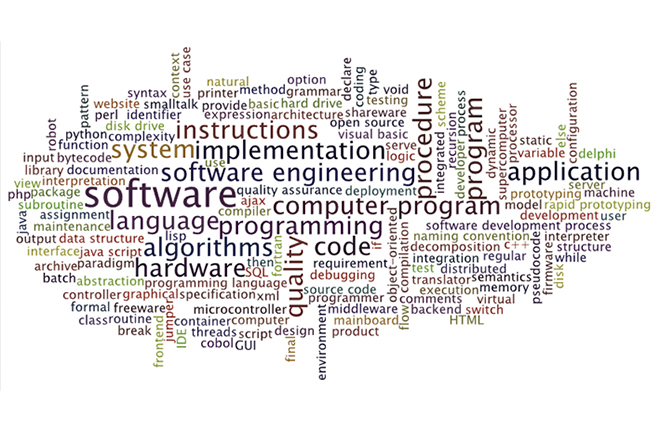Science through the prism of terminology

Computer science terminology Photo: TUCHONG
Humanity’s relentless quest for knowledge and exploration of the world fuels the deepening of our scientific understanding. The current state of scientific development is generally represented through terminology, with important terms providing simple explanations and methods for cross-referencing scientific nomenclature. It can be said that terminology acts as a “prism” reflecting the scientific landscape.
Scientific understanding
Scientific understanding consists of specific scientific concepts. These concepts give rise to systems of terminology in the form of language, contributing to scientific theories. As scientific understanding improves, terminology is continuously endowed with new meanings to denote new concepts. Introducing and using the correct terminology constitutes the basis for observing things from a scientific perspective and understanding the objective world.
Hierarchy of terminology
The development of terminology itself represents a process of scientific understanding. There are four main types of terminology variants, which function as hierarchical expressions of human scientific understanding.
The first variant is prototype terminology. Prototype terminology is primarily used to label specialized knowledge but lacks relatively strict definitions. Its meaning and form are relatively stable, and its rhetorical tone is relatively neutral. Prototype terminology is commonly known as colloquial names, as it is not underpinned by scientific theories. As science continues to progress, some prototype terminology will eventually transition into true terminology, and its content will gradually become more scientific.
The second variant is quasi-terminology, which functions similarly to terminology and is used to label simple concepts, but lacks stability and may be ambiguous. It is also referred to as semi-terminology, as it generally comprises specialized vocabulary without clear conceptual boundaries. With increased efforts to organize terminology, some of quasi-terminology will transition into true terminology, while others will fall into disuse.
The third variant is primitive terminology, a specialized vocabulary unit used to establish new concepts of scientific objects. While it shares many common features with terminology, primitive terminology is not characterized by conciseness and simply serves to enumerate in most cases. Its form is relatively stable, but its meaning is unstable, and its rhetorical tone is non-neutral. Primitive terminology also tends to be time-sensitive. Over time, as science advances, it may either lose its status as terminology, or be improved to become true scientific terminology.
The fourth variant is jargon, which is essentially equivalent to terminology and denotes concepts within specialized fields. It often arises from highly developed industrial production. Without standardized usage, it is sometimes used by professionals in oral communication on informal occasions. Jargon is stylistically limited, rhetorically expressive, and has emotional connotations.
While its main function is scientific understanding, terminology also possesses communicative attributes, offering operating guidelines for professional communicators. Discipline-specific terminology from a particular era can reflect the level of human understanding of the objective world during that period, as well as the degree of specialization and the development stage of the discipline.
Scientific expression, communication
Scientific language is a means of expressing scientific thought and facilitates information storage and exchange. Terminology emerges from scientists’ observation and understanding of objective phenomena. The process of everyday vocabulary evolving into terminology, known as terminologization, occurs in tandem with scientific understanding. Terminologization is primarily achieved through defining and metaphorizing. Defining involves attributing professional meanings to everyday vocabulary, while metaphorizing typically involves incorporating everyday vocabulary in terminology based on similarities in form, function, action, and other aspects.
Terminology aids in popularizing specialized concepts. As terminology results from the exploration of the nature of research objects and represent their characteristics, users can grasp the meaning of terms in the absence of definition. Terminology can also give rise to new concepts. By identifying associations between similar concepts based on shared components, scientists can make new discoveries and cultivate new ideas. The establishment of a new discipline usually necessitates the naming of a set of new concepts, requiring new vocabulary to express new ideas.
In conclusion, terminology is of great significance for the development of science. Scientific thought, from generation and processing to the establishment of concepts, relies on terminology at every stage. Cognitive images are solidified into objects of thought by relevant terminology. Terminology can encapsulate, expand, and convey scientific knowledge, and stabilize information acquired by humans. The connections between terms reflect the connections between things, and related terms gradually form a cognitive structure that enhances human understanding of objects.
Wang Ying is from Heilongjiang University. Gou Yunsheng is an associate professor from Shanghai International Studies University.
Edited by WANG YOURAN
